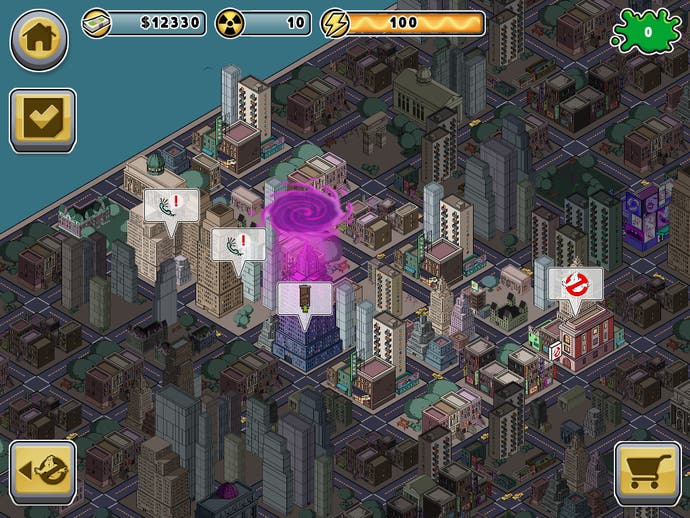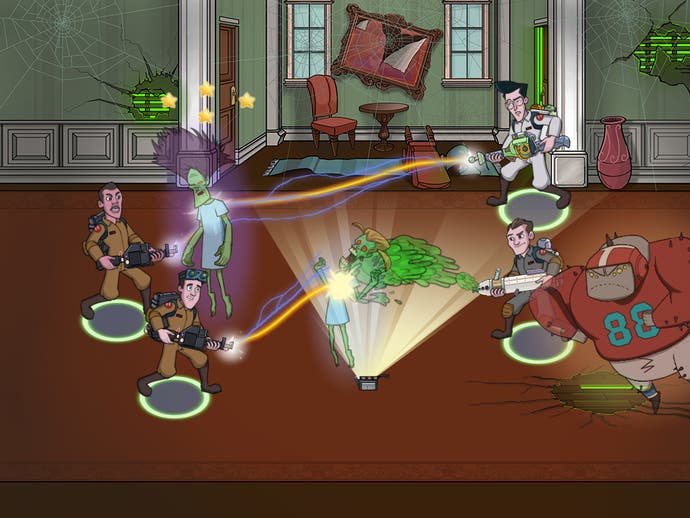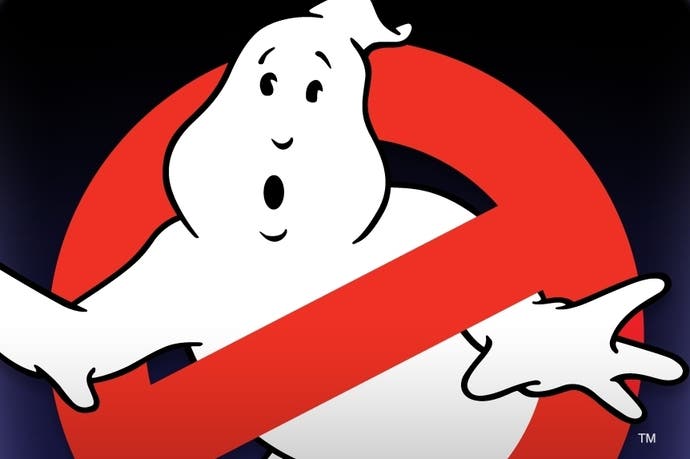Ghostbusters review
Grindin' makes me feel bad.
I'm always surprised that there aren't more Ghostbusters games, especially in the management sim genre. David Crane's 1984 official tie-in got the ball rolling with a game that asked you to run the Ghostbusters business rather than simply zapping spirits, but nobody has bothered to revisit the idea. Until now.
Unfortunately, the developer doing the revisiting is Capcom's Beeline Interactive, the same studio responsible for the controversial Smurfs' Village, one of the first iOS games to raise questions about the micro-payment gameplay model. Ghostbusters, sadly, follows the same payment-heavy, gameplay-lite path.
After a short tutorial in which you're schooled in the ways of bustin' by cartoon versions of Venkman, Stantz, Spengler and Zeddemore, you're left to your own devices as the owner of the New York Ghostbusters franchise with three new recruits in your team. A nearby skyscraper has been taken over by a mysterious purple portal and your long term goal is to reach the top of this tower and save the day.
Of course, that's not a task that the game wants you to complete any time soon. Access to each floor of the skyscraper is only possible once you've earned enough slime, which is earned by completing call outs to other hauntings, each of which uses up some of your allotted power cores. Run out of power cores and you'll either need to stop playing or start paying.

New items can be researched, but completion times vary from 30 minutes to 24 hours and more. Ghostbusters can be levelled up, but only once you reach upgrade books on specific floors of the skyscraper you're slowly ascending. At every turn, the game holds you back, blocks your path or erects meaningless obstacles to steer you in the direction of the checkout icon. Very quickly, the volume of resources you need to gather in order to progress escalates into triple and quadruple figures and you're left facing an exhausting uphill grind - a grind which can be alleviated at any time, of course, by parting with some of your real world cash.
So where's the gameplay in this begging bowl scenario? That comes when you answer those calls, as your troop of 'busters pops up in a variety of static locations and various ghosts wander onto the screen from each side. You tap and drag to direct the attention of each Ghostbuster onto a spirit, and once its energy has been worn down you tap again to capture it. There are different types of Ghostbuster - scientist, blaster or wrangler - but there's just not enough nuance in the encounters to make any tactical use of them. Clear all the ghosts and you get to tot up the cash and slime earned.
Trouble is, it's just not fun. There's a small element of strategy in how you tackle the different ghosts, with their varying attack patterns and movements, but it's so gracelessly executed. Ghostbusters will sometimes automatically move to attack a nearby ghost, but at other times will stand idly by while something right next to them chips away at their health. Selecting the Ghostbuster you want is a fiddle, thanks to the clumsy way the sprites overlap, and even with new foes introduced at certain points, it all becomes painfully repetitive.
It's a prime example of that upside-down design mentality that requires the "game" element to be so slow and frustrating that the player feels compelled to pay in order to skip it.

You quickly realise that there's absolutely no point to anything you're doing. You grind through identical battles dozens of times to scrape together enough credits to earn the right to grind through more identical battles. It's a prime example of that upside-down design mentality that requires the "game" element to be so slow and frustrating that the player feels compelled to pay in order to skip it.
The traditional sense of progression and escalation that would normally lure you onwards in a real game is gone, replaced with a gaudy shop window selling nothing. Ghostbusters isn't the only mobile product guilty of such craven commerce, but it is one of the most shameless and, with its squandering of a beloved movie licence, one of the hardest to swallow. It's especially weird that a bold artistic experiment like Proteus can prompt fevered discussion as to what constitutes a "game" while cynical titles like this slither by without commentary.
With no meaningful play mechanics and no structure beyond the one dictated by the storefront, Ghostbusters is little more than a Pavlovian machine designed to suck money out of your account a few pence at a time. There's a world of difference between a game that uses micro-payments and a micro-payment model that is simply delivered in the guise of a game. If Ghostbusters has any value at all, it's as an illustration of this important point.


